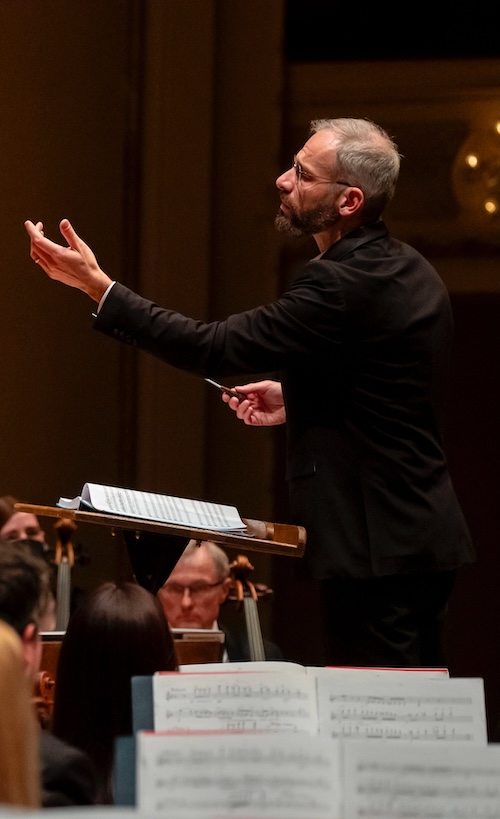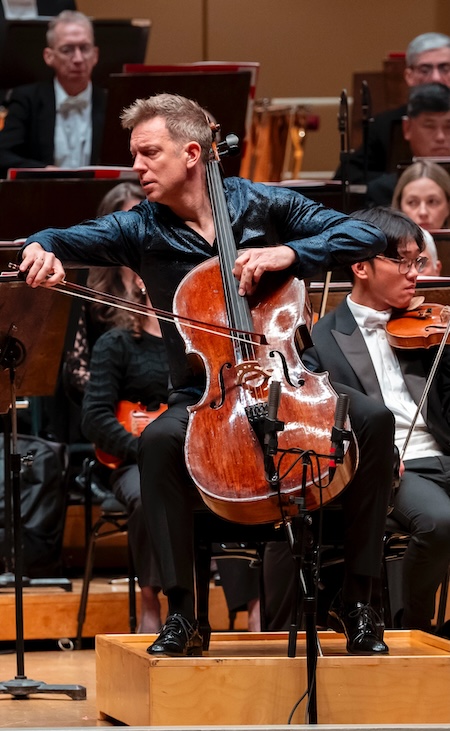Conductor makes a fiery CSO debut with compelling program

Programming by the Chicago Symphony Orchestra has largely been less than scintillating this first half of the 2024-25 season. Yet Thursday night’s concert—offering an edgy 20th-century concerto and a rarity by a popular Russian composer—delivered not only a skillfully balanced lineup but one of the most compelling CSO concerts of the year. It’s too bad there were so many empty seats.
Much of the credit for the success of the evening goes to conductor Dima Slobodeniouk, who made a most impressive downtown debut. (His sole previous CSO stand was a Ravinia concert in 2017.)
In recent years, Slobodeniouk has been making regular rounds with the top American orchestras, including the Boston Symphony, New York Philharmonic and others, invariably to accolades.
A tall, professorial presence, the Russian-born Finnish conductor led performances Thursday night that combined lucidity and scrupulous balancing with an eruptive brilliance and intensity. Each of the evening’s three works received clear, acutely focused performances that were never merely clinical yet also imbued with passion and warmth.
The Suite No. 1 from Edvard Grieg’s Peer Gynt is no longer the obligatory concert boilerplate it was in the 20th century, and one can appreciate the color, graceful melodism, and artful scoring of this incidental music for Ibsen’s play even more in its less frequent appearances.
This familiar music came up remarkably fresh with Slobodeniouk and the CSO. “Morning Mood” emerged lovely and bucolic in an expansive reading. The strings plumbed a striking degree of elegiac feeling in the threnody of “Ase’s Death,” the conductor alertly marking dynamic shifts. Anitra danced with an aptly pensive lilt. While firmly controlled, “In the Hall of the Mountain King” built the insistent theme to a high-speed frenzy, though one would have liked greater trumpet brilliance to ring out at the climactic bars.
Witold Lutosławski was an objectivist who believed that all his works should be viewed as pure music without any underlying or explanatory program. Yet in his dramatic Cello Concerto, written by the Polish composer for Mstislav Rostropovich and premiered by the great Russian cellist in 1970, it’s hard not to feel that a sub rosa narrative exists.
At the time both men—Rostropovich, particularly—were being persecuted by the Communist cultural commissars of their respective countries. Soviet apparatchiks banned the world premiere of the Cello Concerto from being broadcast in either Poland or the Soviet Union.
Against that backdrop, it is hard not to feel the 23-minute concerto represents a struggle of sorts between the individual (the cello soloist) set against malign and violent opposing forces (the orchestra, brass especially).
That sense of a seismic, life-or-death battle was inescapable in the riveting performance given by soloist Johannes Moser Thursday night.

Lutosławski packs a remarkable amount of musical incident into this concise work, cast in four unbroken sections. The concerto opens in unorthodox fashion with the cellist playing a series of repeated D’s. The soloist tries to assert himself with aggressive pizzicatos, quirky glissandos, driving energy and bursts of hyperactive bravura. Yet each time he is forcefully silenced by a trio of strident trumpets (and eventually other instruments) in a musical mano a mano, similar to some of Shostakovich’s passages in which a solo instrument seems lost in a barren and oppressive wilderness.
At times the solo cello is able to coax the strings and winds into a more collaborative musical dialogue—notably in an extended cantilena that grows into rhapsodic lyricism until it is harshly suppressed by the menacing brass and percussion. The back-and-forth conflict continues with mounting intensity until repeated massive orchestral chords seem to beat the cello into dejected submission. Yet at the coda, the soloist rises out of apparent defeat to close the work as it began with a series of repeated notes—this time with an unmistakable feeling of renewed strength and defiance.
Soloist Moser delivered a mesmerizing, tour de force performance, surmounting all the myriad hurdles of this challenging score, both technical and interpretive. The cellist carved out a firm dramatic arc, exploring a wide range of hues and dynamics and playing with unbridled intensity.
Slobodeniouk and the orchestra were equal partners, the attentive conductor making every element of this multifaceted score come across with powerful impact and drawing some of the most roiling and intense playing from the orchestra heard all year.
Last season the CSO did Sergei Rachmaninoff proud in his 150th anniversary year, programming two of his five concertante works as well as his Second and Third Symphonies. I wrote at the time that it was unfortunate they didn’t also program the composer’s neglected Symphony No. 1. Well, ask and ye shall receive.
Few works in the classical canon are more renowned for their failure than Rachmaninoff‘s First Symphony. The young composer was enjoying a fast-rising career until the disastrous premiere of this work in 1897 slammed the brakes on his success. (Rachmaninoff maintained that the performance was undermined by the conductor, Alexander Glazunov, being drunk.) The negative public response and devastating reviews plunged the 22-year-old composer into a deep depression, which continued for years with Rachmaninoff unable to complete any work of substance. Psychoanalysis and hypnosis sessions eventually brought him out of his funk with the composer writing his celebrated Piano Concerto No. 2, which was dedicated to his therapist.
Rachmaninoff’s First Symphony remains an infrequently played work (the CSO didn’t get around to a first performance until 2010). Stylistically, the symphony is something of an outlier in Rachmaninoff’s oeuvre. While the voice is unmistakably that of the Russian composer, a pervasive gloom predominates, bleaker and less varied than in his popular mature works. Rachmaninoff’s favored motif of the Dies Irae is often to the fore and the symphony ends, not in optimism and energetic brilliance, but in a strange, shadowy darkness.
Slobodeniouk led a commanding performance that made an eloquent case for the symphony’s wider revival. The conductor displayed a complete understanding of this somewhat intractable score; one would have to go back to Gennady Rozhdestvensky’s live 1990 recording to find a more insightful or sympathetic account.
Slobodeniouk directed the CSO in a concentrated yet flexible manner, exploring details while maintaining a firm momentum that made it seem more unified. Even with attentive focus bar to bar, Slobodeniouk had the destination of each movement in clear sight.
The dark-hued main theme of the opening movement went with ample energy, weight and sable string tone—rarely has the CSO sounded more authentically Russian—yet the moments of fragile lyricism blossomed as well. The lightly sprung charm of the second movement was as evident as the lurking shadows.
The music benefited from Slobodeniouk and the musicians allowing room to breathe. The Larghetto conveyed the uneasy pastoral quality with Stefán Ragnar Höskuldsson contributing a forlorn flute solo. Back from his extended hiatus due to a pinched nerve, concertmaster Robert Chen duetted gracefully with cellist John Sharp in a fleeting lyrical passage.
The finale’s martial blast of fanfare-like brass was duly imposing and the conductor balanced the brooding aspects and explosive moments convincingly. The closing section with its glowering, repeated dragging phrases still seems bizarre yet this impassioned performance overall made a better case for this strange yet compelling symphony than one is ever likely to hear.
The CSO musicians seemed truly inspired by their podium guest and played with extraordinary fire and ferocity across all sections. Let’s hope that Dima Slobodeniouk gets his return ticket to Chicago punched soon.
The program will be repeated 1:30 p.m. Friday and 7:30 p.m. Saturday. cso.org
Posted in Performances



Posted Dec 06, 2024 at 2:51 pm by Peter Todd Borich
Fabulous concert. The Lutoslawski concerto was strange, but absolutely riveting due to the performance of all forces involved. The sonority of the orchestra and an energized conductor was on full display in the Rach #1, which, at least for an evening, allowed me to bury my memories of the horrific Muti Bruck-manioff #2 a year-and-a-half ago.
Posted Dec 06, 2024 at 8:37 pm by Tim
As I recall, Dima Slobodeniouk was also considered a finalist for the Minnesota Orchestra music director position a couple of years ago, receiving rave reviews in the Twin Cities in his podium appearances. Some smart orchestra of note is sure to elevate his stature even more, and contract with him for a significant role soon.
Posted Dec 07, 2024 at 2:55 am by Chuck
I attended Friday’s matinee concert and greatly appreciated reading this wonderfully descriptive and incisive review just prior to the concert. This made the anticipation of what was about to happen on stage so much the better. Everything in the review seemed to apply to Friday’s concert as well. Total treat of programming, conducting and playing by the orchestra. Would love more concerts like this. During the preconcert warmup I could not resist sharing with the regular Friday concert subscribers near me the title of this review on my phone screen.
The program notes by Phillip Huscher were — as always — highly informative and interesting. I cannot imagine a CSO concert without them. The same goes for the 30-minute preconcert conversations that begin 75 minutes before the start times.
Posted Dec 07, 2024 at 6:09 am by Chris Sheahen
I was there for the Friday matinee and happy to report the hall was about 95% full. I generally agree with your review. My wife thought the Lutoslawski was outstanding. I want to hear it again. The Rachmaninoff was a bit episodic for me, although the playing was rich and balanced. The conductor seemed in control, and the musicians followed him well.
Posted Dec 07, 2024 at 11:35 am by Steve
Attended Friday’s excellent concert and this review was consistent with my own observations. I would add only that Lutosławski should be given the title “Master of the Orchestral Scream”, of which there were a couple, led by the brass. That there was a sub rosa narrative was undeniable, evidenced by those collective screams alone.
Posted Dec 07, 2024 at 3:22 pm by Julius
Dima Slobodeniouk.
Possible successor to Andris Nelsons at the Boston Symphony?
Posted Dec 08, 2024 at 11:55 pm by Peter DG
Just a note to Chuck above: for the Lutoslawski piece the program notes were NOT by Phillip Huscher but by the late Steven Stucky. Yes, they were excellent.